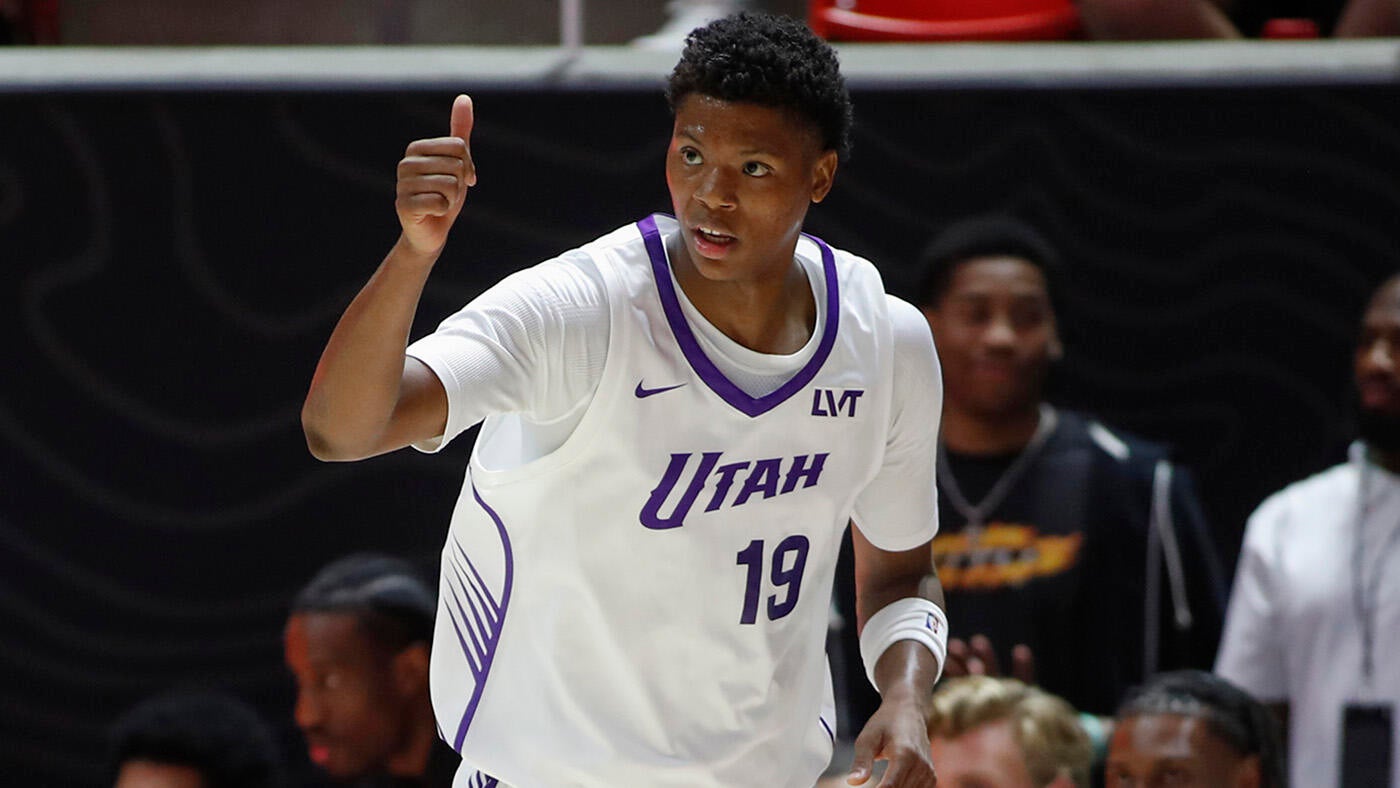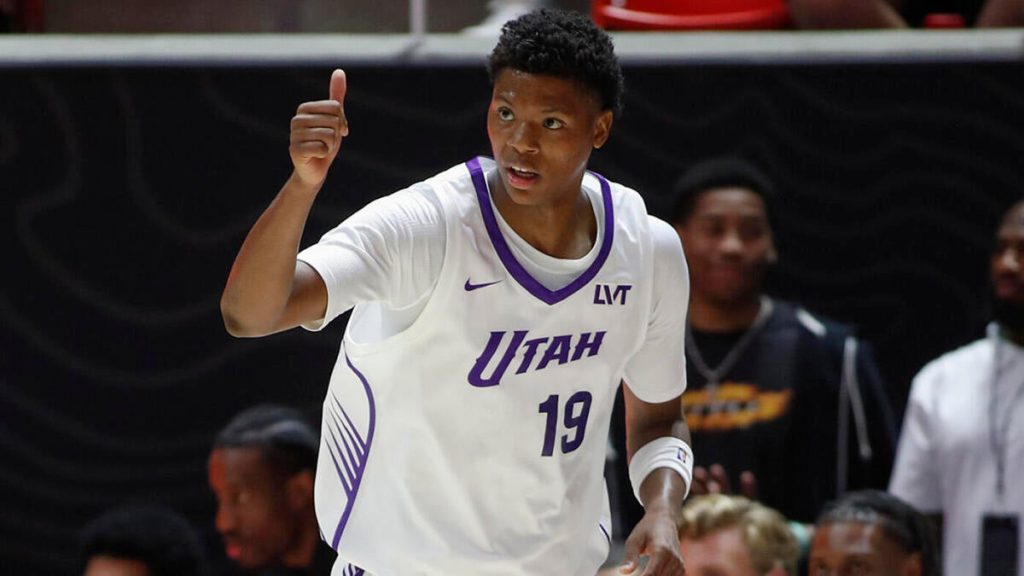
In 2022-23, the Utah Jazz were in a sweet spot. They’d entered rebuild mode the previous summer, trading Donovan Mitchell and Rudy Gobert (and, famously, Royce O’Neale) for a combination of draft picks, pick swaps, prospects and rotation players. Their 10-3 start wasn’t sustainable, but it quickly became clear that Lauri Markkanen, the 7-foot sharpshooter they acquired in the Mitchell deal, was much more than a rotation player: He averaged 25.6 points on 64% true shooting, earning an All-Star appearance and the Most Improved Player award. Utah fell out of the playoff race and finished 37-45, but only after dumping several key contributors at the trade deadline and rolling out some ridiculous lineups down the stretch.
The Jazz’s future seemed bright because the possibilities seemed endless. They could hit the gas by trading for a star, build patiently through the draft, or do something in between. A couple of years later, though, it’s fair to wonder how much patience they have left. They’re coming off a 17-65 season in which Markkanen, now 28 years old, averaged 19 points on 57.1% true shooting while being paid 30% of the salary cap. They have yet to come to terms on a rookie extension with Walker Kessler, who has been in trade rumors for virtually his entire career. Nobody they drafted in 2023 and 2024 (Taylor Hendricks, Keyonte George, Brice Sensabaugh, Cody Williams, Isaiah Collier, Kyle Filipowski) has established himself as part of the core. They have a new team president, Austin Ainge, and it’s unclear whether No. 5 pick Ace Bailey will make him look brilliant or boneheaded. To borrow a metaphor from Sam Hinkie, they’ve planted a lot of seeds, but the orchard is far from full bloom.
The State of Play
Last year: In Year 3 of its rebuild, Utah didn’t wait to pile up losses: It was 10-36 at the end of January, after being 26-26 at that point in Year 1 and 24-25 in Year 2. In comparison to the late-season Jazz, though, the early-season Jazz were actually awesome. From the beginning of March onward, the team won 2 of its 23 games, with a league-worst net rating of -14.7. In March, Utah was fined $100,000 for violating the Player Participation Policy, but that policy doesn’t prevent teams from benching their best players in the second halves of games, so the Jazz did just that. They finished with the worst record in the league, which guaranteed that their draft pick would land no lower than fifth.
The offseason: They fell as low as they could go in the lottery and selected Bailey, a 6-foot-7 bucket-getter who had declined to work out with them (and certain other teams). They also traded up from No. 21 to No. 18 to select Walter Clayton Jr., a 22-year-old point guard who had increased his stock by leading Florida to the NCAA title. They strangely gave up a second-round pick to trade Collin Sexton for Jusuf Nurkic, but they added three second-round picks by trading John Collins for Kevin Love and Kyle Anderson and absorbing Georges Niang’s contract.
Vegas over/under: 18.5 wins, per BetMGM
The Conversation
Jazz believer: I admit I was hoping the Jazz would get Cooper Flagg, but the lottery is the lottery. The moment that Austin Ainge said that their “dream scenario” going into the draft was landing both Ace Bailey and Walter Clayton Jr., I officially moved on (and got extremely familiar with Bailey’s highlights). Months later, it’s still crazy to me that Bailey was even available. He has more upside than the three guys drafted directly ahead of him, and star wings remain the most valuable archetype in the league. There is no doubt in my mind that Will Hardy and the player development staff will get the most out of him. To me, the Jazz are the 2021-22 Thunder: They need some time, but not as much time as people think.
Jazz skeptic: Unless Cody Williams is about to turn into Jalen Williams, you’re out of your mind. The Jazz haven’t drafted half as well as the Thunder — a total anomaly in the history of NBA team-building, by the way — and Lauri Markkanen is not Shai Gilgeous-Alexander. Despite all the losing, I liked watching OKC at the beginning of the Mark Daigneault era, and I actually liked watching Utah at the beginning of the Hardy era, too. I can’t say the same about last year’s team, though. So many horrible turnovers. Such terrible defense. Bad, bad, bad.
Jazz believer: Did you even watch last year’s Jazz? Winning obviously wasn’t the priority, but they were well coached and played hard, just like the Thunder did when they were a lottery team. Fun fact: The lineup that Utah used the most (Keyonte George, Collin Sexton, Markkanen, John Collins and Walker Kessler) had a plus-7.4 net rating. The problem is that the lineup only played a total of 196 minutes over 15 games. Anyway, enough about last season. Cody Williams may not be the All-NBA player that is brother is, but, based on summer league, he’s already a completely different — and much stronger — player than he was as a rookie. I expect Markkanen to bounce back in a big way, I expect Clayton to contribute immediately and I can’t wait to see how the returning young players have developed over the summer. Kyle Filipowski dominated summer league, but Taylor Hendricks is my favorite young Jazzman; with him and Bailey on the court, the Jazz are going to be so much more athletic (and fun!) than they’ve ever been.
Jazz skeptic: I love the idea of Hendricks — a 3-and-D guy who is long and athletic enough to guard just about anybody — but he missed virtually all of last season and spent a good portion of his rookie year in the G League. I suggest you keep your expectations modest for both him and Bailey, the latter of whom should clearly be seen as a long-term project. In fact, the main reason I’m down on the Jazz rebuild is that, the one time they committed to the tank, the Basketball Gods punished them. Ainge took a big swing on Bailey, and I think it might be a massive whiff. The guy has some of the worst shot selection I’ve ever seen, his ballhandling is suspect, his passing instincts are terrible, his lack of upper-body strength presents numerous problems and he doesn’t compete well on defense. If Hardy’s staff can turn him into a winning player, they’re a bunch of miracle workers. (Also, are you sure you want to argue that last year’s Jazz played hard? My favorite quote of the whole season was Hardy describing a 50-point loss against Dallas: “That was an absolutely horrendous performance from start to finish. That was a masterpiece of dogshit.”)
Jazz believer: That was one game! He also said, “I haven’t been disappointed in our team very often this year,” but I guess you must have missed that part of the quote. Also, Bailey is barely even 19 years old! I remember people nitpicking Jayson Tatum and Anthony Edwards in similar ways when they were draft prospects. Some of your criticisms of Rutgers Ace Bailey have merit, but Utah Ace Bailey will not have the same role. Besides, you can work on your ballhandling, your strength and your decision-making. His unbelievable shot-making, his high release point, his confidence and his athleticism are all things you can’t teach. Most star scorers have shortcomings on defense at his age, and most can’t fly around and block shots as a help defender the way that he can. In a way, the Jazz are lucky that Bailey wasn’t more of a complete player in college. If he had been, there is absolutely no way they would have had a chance to land someone this talented at No. 5.
Jazz skeptic: All I’m saying is I want my franchise cornerstones to do the same thing that Ainge has pledged to do as team president: Make “a lot of good decisions over and over and over.” I’ve seen nothing that suggests Bailey is that kind of player, and, to put it kindly, the jury is still out on a lot of the decisions that the Jazz’s front office made before Ainge’s arrival. Going forward, I have a few very basic questions about their future: What are the chances that one of Keyonte George, Isaiah Collier or Clayton will turn out to be a starting-caliber guard? Why is Jusuf Nurkić here? And how much more of this is Markkanen willing to take?


